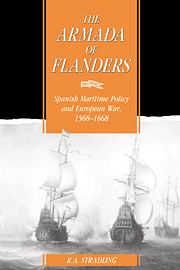Book contents
- Frontmatter
- Contents
- Preface
- Acknowledgements
- Glossary
- Rough comparative values of Spanish and Flanders currencies, c. 1620–60
- List of abbreviations
- Maps
- Part I Prologue – Failure and retrenchment, 1568–1621
- Part II The great offensive, 1621–1640
- Part III Dunkirk and the defence of Empire, 1640–1658
- Part 4 Quills, keels and cutlasses
- 8 Men and ships – the cutting edge
- 9 Administration – structures, personnel, finance
- 10 Prizetaking – plunder of a century
- Epilogue Decay and transition, 1658–1668
- Appendices
- Bibliography
- Index
- Cambridge Studies in Early Modern History
10 - Prizetaking – plunder of a century
Published online by Cambridge University Press: 22 September 2009
- Frontmatter
- Contents
- Preface
- Acknowledgements
- Glossary
- Rough comparative values of Spanish and Flanders currencies, c. 1620–60
- List of abbreviations
- Maps
- Part I Prologue – Failure and retrenchment, 1568–1621
- Part II The great offensive, 1621–1640
- Part III Dunkirk and the defence of Empire, 1640–1658
- Part 4 Quills, keels and cutlasses
- 8 Men and ships – the cutting edge
- 9 Administration – structures, personnel, finance
- 10 Prizetaking – plunder of a century
- Epilogue Decay and transition, 1658–1668
- Appendices
- Bibliography
- Index
- Cambridge Studies in Early Modern History
Summary
For close on a hundred years, warships sailed from the ports of Flanders in search of plunder in the North Sea. If not always directly guided by Spain, their actions were a response to Spanish maritime policy. The shark's share of plunder was taken not by the armada, but by the private operators, known in Walloon as armateurs and in Spanish as armadores or particulares. It was the private sector which sustained the development of privateering in the Flemish ports after 1621. Although the purely economic dimension of the phenomenon is not the concern of this book, it cannot be entirely ignored when considering the military–strategic issues; neither can the role of the town of Dunkirk itself, the dynamic locus of our study. The privateers carried on the economic war. In many operations they sailed alongside the armada. Ex-privateering skippers were often to be found commanding royal frigates. In short, their world was as inextricably connected to that of the official squadron as one Siamese twin is to the other. While it is a hazardous business to separate them completely it is usually necessary, for both descriptive and analytical purposes, to distinguish between them.
THE REGULATION OF PRIVATEERING
During the epoch of nearly two centuries when the Flemish ports were the centre of such activity, the great majority of prizes – in some years, virtually 100 per cent – were taken by privately-owned warships.
- Type
- Chapter
- Information
- The Armada of FlandersSpanish Maritime Policy and European War, 1568–1668, pp. 204 - 228Publisher: Cambridge University PressPrint publication year: 1992



